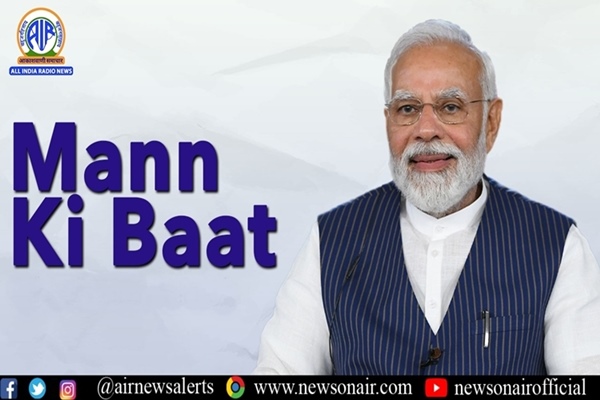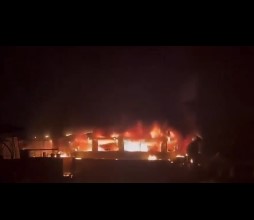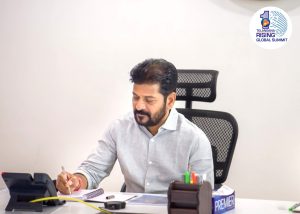Prime Minister Narendra Modi today expressed pride that science is progressing with renewed energy in 21st-century India. Addressing the nation in his Mann Ki Baat program on Akashvani, Mr. Modi spoke about Indian Air Force Group Captain Shubhanshu Shukla’s return from space. He noted that there was a wave of happiness, and the entire country felt a sense of pride when the Indian astronaut landed safely on Earth.
The Prime Minister recalled that the successful landing of Chandrayaan-3 in August 2023 created a new atmosphere in the country. He said that children began to show curiosity about science and space, developing ambitions of becoming space scientists.
Mr. Modi highlighted the INSPIRE-MANAK Abhiyan, a campaign to promote innovation among children. Under this initiative, five children are selected from each school, with each child presenting a new idea. The Prime Minister expressed happiness that lakhs of children have participated in the initiative so far. He also mentioned the rapid growth of Space start-ups in the country, pointing out that there were fewer than 50 start-ups in space sector five years ago, and the number has now increased to over 200.
National Sports Day will be observed on the 23rd of August. Prime Minister Modi urged listeners to share ideas on how to celebrate the day via the NaMo app. Mr. Modi praised Indian students who brought glory to the nation by winning medals at the International Chemistry Olympiad held in Dubai earlier this month. The students were Devesh Pankaj, Sandeep Kuchi, Debdutt Priyadarshi, and Ujjwal Kesari. At the International Mathematical Olympiad held in Australia, Indian students won three gold, two silver, and one bronze medal. The Prime Minister stated that India has strengthened its position in the world of mathematics.
Prime Minister Modi highlighted that the Astronomy and Astrophysics Olympiad will be held in Mumbai next month, with students from more than 60 countries participating in the event. He remarked that this will be the largest Olympiad to date and stated that India is now advancing in both the Olympics and Olympiads.
The Prime Minister expressed pride that UNESCO has recognized 12 Maratha forts as World Heritage Sites. These include eleven forts in Maharashtra and one in Tamil Nadu. The Prime Minister elaborated that each fort has a rich history, from Salher Fort, where the Mughals were defeated, to Shivneri Fort, where Chhatrapati Shivaji Maharaj was born.
Mr. Modi noted that there are many other remarkable forts across India, which have withstood attacks and the vagaries of weather. He mentioned Chittorgarh Fort, Kumbhalgarh Fort, Ranthambore Fort, Amer Fort, Jaisalmer Fort, Gulbarga Fort, and Chitradurga Fort. He also mentioned that Mahmud Ghaznavi attacked Kalinjar Fort at Banda in Uttar Pradesh, multiple times but failed each time. The Prime Minister further noted that Bundelkhand has several forts — Gwalior, Jhansi, Datia, Ajaygarh, Garhkundar, and Chanderi — which are symbols of India’s heritage. He urged people to visit these forts and learn about their history.
Prime Minister Modi opined that August is the month of revolution, highlighting the courage of 18-year-old freedom fighter Khudiram Bose. He said that when the freedom fighter walked toward the gallows on 11ts of August, 1908, there was a smile on his face, while tears filled the eyes of the people of Muzaffarpur, Bihar, who gathered around the jail where the young patriot was paying the price for his patriotism. The Prime Minister emphasized that India earned independence through countless sacrifices, with the nation’s diehard patriots nurturing the freedom movement with their blood.
The Prime Minister also noted the death anniversary of Lokmanya Bal Gangadhar Tilak on 1st of August, and the Quit India Movement led by Mahatma Gandhi, which began on the 8th of August. Mr. Modi said the nation will celebrate Independence Day on 15th of August. He added that the pain of Partition is intertwined with India’s Independence, which is why 14th of August is observed as Partition Horrors Remembrance Day.
Mr. Modi also spoke about the Swadeshi Movement, which began on the 7th of August 1905. He mentioned that the movement gave new energy to local products, especially handloom. To commemorate this, the nation celebrates National Handloom Day on the 7th of August every year. The Prime Minister pointed out that this year marks the 10th anniversary of National Handloom Day. He remarked that the textile sector has become a major strength of the country.
Over the past decade, countless individuals in different parts of India associated with this sector have created many success stories. Mr Modi cited the example of Kavita Dhawale from Paithan village in Maharashtra, who received help from the government and now sells her own self-made Paithani sarees. He was pleased to mention that more than 650 tribal women in Odisha’s Mayurbhanj have revived the Santhali saree, earning thousands of rupees per month.
These women are not just making clothes but also creating their own identity. He also mentioned Naveen Kumar from Nalanda, Bihar, whose family has been involved in handloom sector for generations. His children are now studying handloom technology.
The Prime Minister emphasized that textiles in India are not just an economic sector but also a representation of the country’s cultural diversity. He expressed happiness that the textile and apparel market is growing rapidly, with contributions from women in villages, designers in cities, elderly weavers, and youth working together.
Over 3,000 textile start-ups are now active in India, many of which are promoting India’s handloom identity on a global scale. Mr. Modi stated that the path to a developed India in 2047 passes through self-reliance, and the foundation of Atmanirbhar Bharat lies in being Vocal for Local. He urged people to resolve to buy and sell only products that are Made in India.
In this episode of Mann Ki Baat, the Prime Minister also spoke about the diversity found in Indian folk songs and traditions, including bhajans and kirtans. He expressed admiration for the Radhakrishna Sankirtan Mandali from Keonjhar district in Odisha, which is raising awareness about forest fires. Pramila Pradhan is the inspiration behind this initiative, and she has added new lyrics and messages to traditional songs to help protect forests and the environment.
Mr. Modi acknowledged that festivals and traditions are an integral part of Indian culture and mentioned that documenting both the present and the past is another important facet of it. He stressed that India’s real strength lies in the knowledge preserved in ancient manuscripts, which contain information on science, medicine, music, and philosophy.
The Prime Minister said that it is the responsibility of every citizen to preserve this extraordinary heritage. He cited the example of Mani Maran from Thanjavur, Tamil Nadu, who started evening classes to teach people to read Tamil palm leaf manuscripts. Mani Maran taught people the method of reading and understanding “Tamil Suvadiyiyal”, which is Palm Leaf Manuscripts. He emphasized that similar efforts across the country could make ancient knowledge part of the consciousness of the new generation.
Inspired by such efforts, the government has launched a historic initiative in this year’s budget, called Gyan Bharatam Mission. The mission will digitize ancient manuscripts and create a National Digital Repository, where students and researchers from around the world can connect with India’s rich knowledge tradition. The Prime Minister urged people who wish to participate in such efforts to contact MyGov or the Ministry of Culture.
Mr. Modi also highlighted the Grassland Bird Census conducted for the first time in Kaziranga National Park in Assam. The census identified more than 40 bird species. The Prime Minister commended the efforts of the team, which installed sound recording devices and analyzed the sounds using computer technology, calling for such initiatives to be promoted to increase global recognition of India’s biodiversity.
The Prime Minister mentioned Om Prakash Sahu from Gumla district, Jharkhand, who left the path of violence to start fish farming. Mr. Modi said that Gumla district was once known for Maoist violence, but Om Prakash’s courage remained unshaken despite receiving threats in the beginning. He received training from the government under the Pradhan Mantri Matsya Sampada Yojana, and today, more than 150 families in the Basia block have joined the fish farming industry. The Prime Minister observed that many former Naxalite members have now become job providers.
Prime Minister Modi also announced that India scripted history by winning nearly 609 medals at the World Police and Fire Games in the United States, a sports tournament for police officers, firefighters, and security personnel from around the world. India ranked among the top three out of 71 countries. The Prime Minister congratulated the athletes and coaches, adding that the next World Police and Fire Games will be held in India in 2029.
The Prime Minister mentioned receiving messages from young athletes and their parents, who praised the Khelo Bharat Niti 2025. He stated that the goal of the policy is clear: to make India a sporting superpower, with a focus on villages, the poor, and girls.
Mr. Modi noted with satisfaction that the Swachh Bharat Mission will soon complete 11 years. He highlighted that it has become a mass movement, with over 4,500 cities and towns participating in the Swachh Survey this year. He praised the people of Kirtinagar, Uttarakhand, for setting a new example of waste management in the hills and mentioned technology-driven organic waste management in Mangaluru. He also spoke about the Green Roing Initiative in Roing city, Arunachal Pradesh, where an entire park has been created from recycled waste. Other cities like Karad and Vijayawada have set examples in water management, while Ahmedabad’s Riverfront has caught national attention for its cleanliness.
The Prime Minister lauded the team in Bhopal called Sakaratmak Soch, consisting of 200 women who clean 17 parks in the city and distribute cloth bags. He also mentioned the Gomti River Team in Lucknow, who have been engaged in cleanliness work every Sunday for the past 10 years. Additionally, he spoke about the women in Bilha, Chhattisgarh, who were trained in waste management and the people of Panaji, Goa, who sort waste into 16 categories.
Concluding his address, Prime Minister Modi extended best wishes to the nation on the occasion of Hariyali Teej. He said that amid the showers of Sawan, the country is once again going to be adorned with the fervour of festivals. He said that the upcoming festivities like Nag Panchami, Raksha Bandhan, and Janmashtami are connected to people’s emotions. He extended his best wishes to the people on the occasion.







